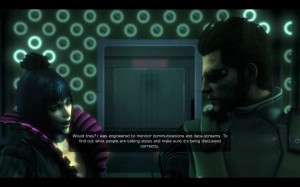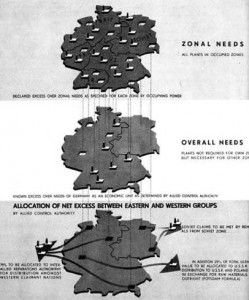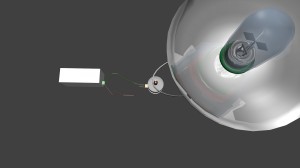I cannot believe this game was made. Eidos Montreal and SquareEnix truly outdid themselves on this masterpiece.
Although this is a game review, there will be a great deal of analysis included in this article. So please note:
POTENTIAL SPOILER ALERT.
One of my best buddies recommended that I play the original Deus Ex back in the year 2001. I loved it.
The adventure, the discussions with shady characters about quite frankly outlandish and scary subject-matter…it all made sense.
It was the stuff that surpassed a good movie. It made you feel like you were IN a good movie.
Deus Ex the Invisible War was an extremely fun experience. It had a similar interface to the original in some ways, but it seemed like a simplified game. Although the story and dialogue was excellent. I also loved that Invisible War was a direct sequel to the original. It definitely did justice and although it felt like a short game, it was extremely fun.
But Deus Ex: Human Revolution…WHOA, this game goes way above the call of duty. It is a prequel to the original Deus Ex. But it feels more like a sturdy addition to the Deus Ex cannon and future history. Well done doesn’t even make sense when discussing this game.
There were some simplifications in this game. For example, your weapon modifications and damage upgrades were simplified from mathematical, to a simple hash-mark chart. Although this system works well, it takes some of the hard-core RPG elements from the game. I personally think it would have been better if they added a secondary, “Advanced Details” section to the weapon information. But the new direction that games are heading in is towards wide-scale user appeal, and that requires some sacrifice. Also, since Deus Ex: Human Revolution was made for PC, XBOX 360 and PS3 it makes sense that they simplified some details. I’m not complaining, it’s just that detailed stats is the only thing that kept this game from being a freak-out gem.
Similarly to the original, you have the choices of lethal and non-lethal combat. One interesting factor is that the melee combat was overhauled to incorporate your energy system. If you get close enough to an enemy you can do either a lethal or non-lethal takedown. The cool part is that each time this happens a mini-custom cutscene occurs that looks absolutely awesome.
On to more esoteric stuff:
I do not feel embarrassed about being a man in my 30’s playing computer games anymore. If you actually read the little, “E-Books” that appear throughout the game, and if you take the time to read the “Hacked E-Mails” you will have acquired immense knowledge about technology and International Politics. You will be able to satisfy basic conversations about the most compelling subject matter imaginable. And even though you learned it with a game with fictional characters and made-up names for corporations and products…the concepts are all based on real technology and real ideas that are being passed around future-tech circles both online and offline.
For example: There are E-Books that discuss everything from how hearing aids really work, through emails that discuss the inner workings of thought control.
Think this is just a game? Nope. It’s your homework. And the people who don’t do their homework oftentime end up doing someone else’s homework…permanently.
In the picture above you see the hero on the right, Adam Jensen talking with Eliza Cassan. She’s talking about how she was created to monitor and INFLUENCE the media. Does she have the power to do so?
Well, if you played though the original game, you’d know all about Echelon and the Aquinas Hub. This goes way beyond media control. Eliza Cassan wants certain messages being discussed, and other ones squelched. There definitely were people pulling the strings, and she’s by no means a final boss. But she’s a key player.
As an AI she has tremendous analytical power. But you find out later about the Hyron Project.
I read several in-game E-Books and saw how the Hyron Project was a quantum computer. This computer I guess was originally built in conjunction with a project to “seed” the ocean floor with iron. This iron would in-turn feed micro-organisms. And these micro-organisms would eventually help the Earth recover from greenhouse gasses and potentially save us from catastrophic global warming.
The idea of the Hyron Project seemed interesting, but I wasn’t sure why they’d need a Quantum Computer for that kind of technology.
Since quantum computers can basically learn about the future, they are far too powerful for a simple project like dealing with nodules and other tasks for regular linked super-computers.
Then I realized, the quantum Hyron Project computer was actually intended for the transcendence which is implied at the end of the original Deus Ex if you choose the Helios ending. And it is also related to the Helios ending choice of the Invisible War.
Hmm, why would these game programmers be so interested in merging with an AI system? What’s the big-deal about this transcendence stuff?
There’s even a new movie starring Johnny Depp coming out called, “Transcendence” and it deals with this whole bigger than life-AI-computer-blobification.
Honestly, I think there are people that are so afraid of dying, that they will go to any means and any lengths to quite literally, “stay in the game.” That’s all it is people. Life is a game. Don’t stress about it.
Here’s something to munch on.
If the Matrix was real based on the Matrix movies. Then remember the AI architect from the 2nd movie? In response to Neo saying, “You need us.” Meaning, the machines need humans for power, the architect responded, “There are levels of survival we are willing to accept.”
Wait a minute? I remember in the 3rd movie, Neo and Trinity take a joyride above the scorched clouds. There is still sunlight, and that means there is plenty of potential solar power for the machines to utilize if they wanted it. How so? They could have easily constructed towers that were higher than the scorched troposphere. These towers could have had solar panels on them. And therefore the entire idea of machines needing people to power their people-cities makes absolutely no sense.
Unless…what if the machines are trying to learn…something?
People and our cities are a form of computer system as well. And that means we can solve problems.
I think that if we were really in a matrix right now, the machines would be keeping us around to see if communion with man and machine is possible. Is it possible to love a machine and not care about the inner workings?
Maybe these AI computers are secretly little smoochers.
Speaking of smoochers. You’re not going to believe what this girl said to me.
There are a couple girls that I’m not really interested in, but I’ve been reading more Buddhist texts and one of them was talking about Eunuchs and how I guess the reason why Buddha took a wife is because if he was a Eunuch then people wouldn’t take him seriously. And after reading that sutra, I thought to myself, “Hey! Maybe I should get back into the dating scene.”
So I asked a different girl what I should say to these girls next time I see them at their jobs. And she said that she would never date anyone who talked to her while she was working.
WHAT?
I asked why. She said that its weird and then she told me this long story about someone who she knew who went to a Japanese restaurant and it all went downhill.
Then I told my friend, “There you go.”
I guessed it. I already knew that I personally was on the fence. And she just sealed the deal. So I’m not going to talk to these girls. I can’t mess up good reading spots anyway.
That’s something you’ll learn. If you find a place where you can read, that is king. Don’t sacrifice that for anything. I was only considering asking people out because I thought I could keep the reading spot AND find a life companion. But no way am I going to toss out a spot that lets me burn through 50+ pages of non-fiction books in one sitting. Sorry folks.
PS: Don’t forget to max out your inventory booster skill early on in Deus Ex: Human Revolution. Being able to carry more stuff makes the game much more enjoyable.
-Tyler



